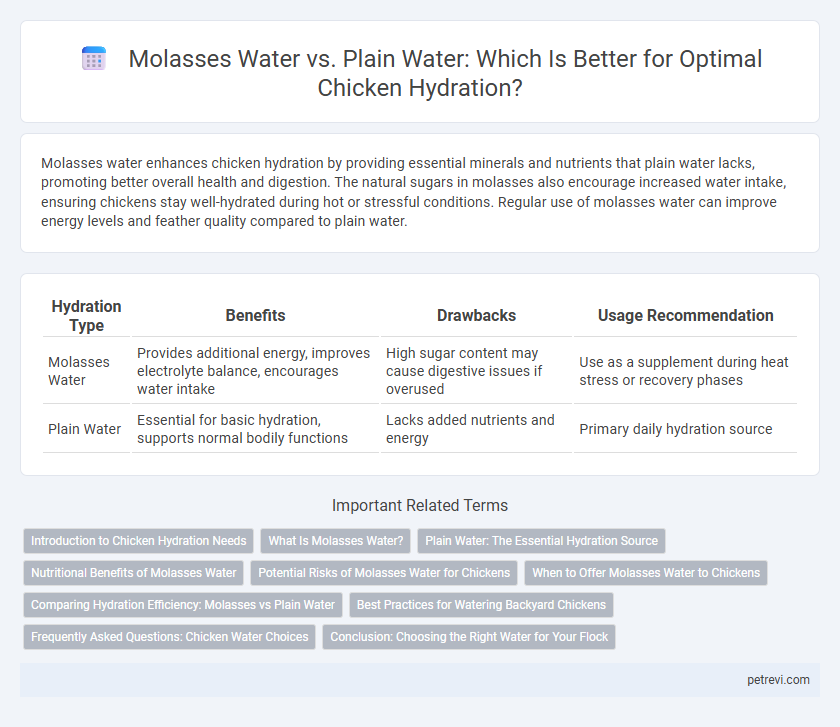Molasses water enhances chicken hydration by providing essential minerals and nutrients that plain water lacks, promoting better overall health and digestion. The natural sugars in molasses also encourage increased water intake, ensuring chickens stay well-hydrated during hot or stressful conditions. Regular use of molasses water can improve energy levels and feather quality compared to plain water.
Table of Comparison
| Hydration Type | Benefits | Drawbacks | Usage Recommendation |
|---|---|---|---|
| Molasses Water | Provides additional energy, improves electrolyte balance, encourages water intake | High sugar content may cause digestive issues if overused | Use as a supplement during heat stress or recovery phases |
| Plain Water | Essential for basic hydration, supports normal bodily functions | Lacks added nutrients and energy | Primary daily hydration source |
Introduction to Chicken Hydration Needs
Chicken hydration demands balanced water intake to maintain optimal health, supporting metabolism and nutrient absorption. Molasses water offers essential minerals, electrolytes, and trace elements that plain water lacks, potentially enhancing hydration efficiency. Proper hydration directly influences growth rates, egg production, and overall immune function in poultry management.
What Is Molasses Water?
Molasses water is a nutrient-rich solution made by dissolving molasses, a byproduct of sugarcane processing, in water, providing chickens with essential vitamins and minerals such as iron, calcium, and magnesium. Unlike plain water, molasses water offers added energy through natural sugars, which can boost chickens' hydration and overall health, especially during stress or illness. This enriched hydration method supports better digestion and immune function, making it a valuable supplement for poultry care.
Plain Water: The Essential Hydration Source
Plain water serves as the fundamental hydration source for chickens, ensuring optimal physiological functions and maintaining electrolyte balance. Unlike molasses water, which contains added sugars that may disrupt digestion or cause excess calorie intake, plain water promotes natural hydration without altering nutrient absorption. Providing fresh, clean plain water consistently supports immune health, enhances feed efficiency, and prevents dehydration-related stress in poultry.
Nutritional Benefits of Molasses Water
Molasses water provides chickens with essential minerals like iron, calcium, and potassium, promoting better overall health and stronger immune systems compared to plain water. Its natural sugars offer a quick energy source, enhancing growth and productivity in poultry. The inclusion of trace elements in molasses supports improved digestion and helps maintain hydration levels during hot weather or poultry stress.
Potential Risks of Molasses Water for Chickens
Molasses water can lead to excessive sugar intake, increasing the risk of obesity and metabolic disorders in chickens. The high sugar content also promotes the growth of harmful bacteria and yeast, potentially causing digestive issues and infections. Plain water remains the safest and most effective option to ensure proper hydration and maintain gut health in poultry.
When to Offer Molasses Water to Chickens
Offer molasses water to chickens primarily during periods of stress, such as extreme heat, illness, or post-vaccination, to provide additional electrolytes and energy. Molasses contains essential minerals like potassium and calcium, which support hydration and recovery more effectively than plain water. Avoid continuous use to prevent excessive sugar intake, reserving molasses water for short-term hydration boosts.
Comparing Hydration Efficiency: Molasses vs Plain Water
Molasses water provides essential minerals and natural sugars that enhance electrolyte balance and energy levels, improving hydration efficiency in chickens compared to plain water. The higher nutrient content in molasses water supports better water absorption and retention in avian tissues, promoting optimal physiological functions. Plain water, while effective in maintaining basic hydration, lacks these additional benefits that contribute to improved overall health and productivity in poultry.
Best Practices for Watering Backyard Chickens
Molasses water for chicken hydration provides essential minerals and trace nutrients that can enhance electrolyte balance and promote better gut health compared to plain water. Best practices for watering backyard chickens include offering fresh, clean water daily while occasionally supplementing with diluted molasses water to support energy levels, especially during hot weather or stress periods. Ensure molasses concentration is kept low (about 1-2 teaspoons per gallon) to prevent digestive issues while encouraging optimal hydration and nutrient absorption.
Frequently Asked Questions: Chicken Water Choices
Molasses water provides chickens with extra nutrients like minerals and carbohydrates, aiding in hydration and energy, especially during stress or illness. Plain water is essential for daily hydration and helps maintain optimal body temperature and digestion in chickens. Choosing between molasses water and plain water depends on the chicken's health needs and environmental conditions, as each option supports hydration differently.
Conclusion: Choosing the Right Water for Your Flock
Molasses water enhances chicken hydration by providing essential minerals and trace nutrients absent in plain water, improving overall health and digestion. Plain water remains crucial for routine hydration but lacks the added nutritional benefits that molasses water offers. Selecting molasses water periodically can optimize flock vitality and support immune function effectively.
Molasses water vs Plain water for Chicken Hydration Infographic

 petrevi.com
petrevi.com